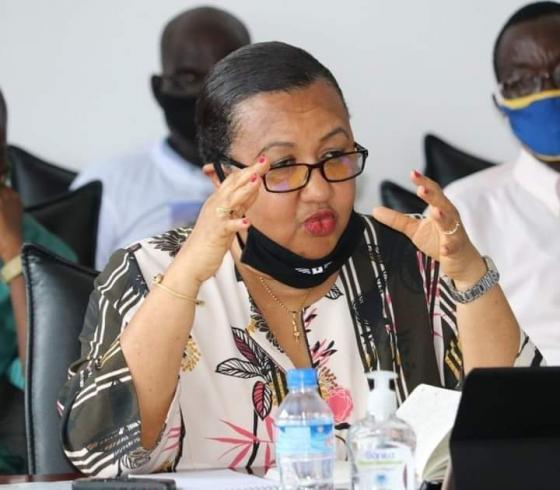Liberia: Agric. Minister Wants Gov’t Prioritize Homegrown School Feeding

Agriculture Minister Jeanine Cooper.
The Minister of Agriculture, Jeanine M. Cooper, says homegrown school feeding in Liberia should not be seen as an option for food security but something the government must prioritize.
She said the priority of the program will improve food security and school education enrollment and retention of school-going children in Liberian schools. Cooper made the statement on June 29th in Monrovia when stakeholders validated the Liberia Rice and Cowpea Value Chain Analysis report.
Homegrown School Feeding is designed to support the production of food grown by local farmers to create market access and to ensure the supply of meals in primary public schools for children, mainly in the rural parts of the country. In Liberia, the program is implemented by four international partners. However, the implementation of homegrown school feeding over the years has faced challenges in funding and local procurement of commodities to supply targeted schools.
To ensure sustainability and impact of the program, especially when it comes to the local procurement of commodities for supply to schools, the World Food Program (WFP) in Liberia, one of the champions of school feeding, has conducted studies on rice and cowpea as the two major commodities to be supported.
The studies seek to identify the challenges confronting the production of rice and cowpea and the need to address those challenges in order to make the program a success. The Agriculture Minister told stakeholders at the validation workshop that the government of Liberia welcomes the studies of the report.
According to her, Liberia has become so import-dependent, which brings about a serious economic crisis for the citizens. She stated that with the homegrown school feeding, Liberian farmers will now have access to better markets to improve incomes in order to adequately support their families.
The Minister also said the program will help improve the education enrollment and retention of the students.
Meanwhile, Cooper has said that there is a need for more investment in agriculture to accelerate the production of food. She mentioned that smallholder farmers are greatly challenged by climate change, making them more vulnerable.
“The lack of rain during critical growing seasons makes our farmers very vulnerable in food production. This is making them continue in poverty and unable to support their families,” she explained.
She disclosed that her Ministry has introduced a climate change project for agriculture with support from partners. According to her, the project seeks to support farmers to mitigate the effects of climate change.
Cooper also said that the Russian Ukrainian crisis also posed a serious threat to the country’s food security given the rise in the prices of some basic commodities.
“The situation facing our country now about food requires serious decision making,” she told the stakeholders. Also speaking at the validation exercise was the new WFP country director, Aliou Diongue, who explained that his institution is pleased to support the homegrown school feeding in Liberia.
He said the analysis report on rice and cowpea is important to understand the concept required to support a sound school feeding program in the targeted counties. Diongue stated that the intention is to improve market demand to stimulate the economy and improve food security mainly in rural counties.
He said to make the program successful it shall require the collective effort of all stakeholders. He added that over the months he has shared the vision of the homegrown school feeding with several government officials and they have expressed their willingness to support the program.
“Since I arrived as the new country director I have spoken the vision of the program to many government officials and they have said it is something that the government would like to support,” the WFP new country director stated.
He reiterated that the importance of the rice and cowpea analysis report is to promote school feeding to improve household incomes. Home-grown school feeding is an approach intended to support rural economic development by stimulating the production and marketing activities of farmers engaged in the production of the targeted food commodities by increasing market demand.
The increased market demands created for the targeted commodities under the pilot project were intended to provide opportunities for local farmers to increase their income through fair prices paid for their produce as well as motivate them to grow more food to enhance food security and rural development.
However, WFP encountered weaknesses in the supply chains of locally produced rice and cowpea, which resulted either in delayed deliveries or failure to access the locally produced commodities on the market.
As a result of the supply-chain failure, WFP commissioned a value chain analysis under the 2030 fund to understand the key constraints and opportunities associated with the development of the two value chains.
The analysis was successfully conducted in five of the fifteen counties of the country Bong, Lofa, Margibi, Montserrado, and Nimba where these value chains have large potential for production and marketing and form a critical part of the home-grown school feeding program.
The government and its partners will now use the findings to develop appropriate interventions to address some of the constraints as well as support the value chain actors taking advantage of some of the existing opportunities.
